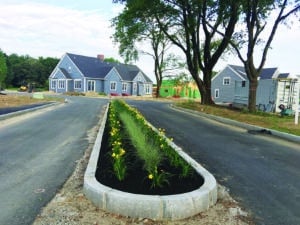
State housing officials told developer Brendon Properties it could not exclude families with children from the affordable units in an over-55 community it’s building in Framingham. Photo courtesy of Brendon Properties
Brendon Properties is pushing ahead with construction as it turns a 37.5-acre former religious retreat center in Framingham into luxury townhomes for the over-55 set, with “pre-construction” prices starting in the mid-$600,000s.
To satisfy the town’s affordable housing requirements, the developer proposed setting aside part of the townhomes in the Northside Meadows project, which bars families with children, at below-market prices.
However, the message state housing officials sent back to the developer couldn’t have been clearer or more right: You can’t build affordable units that ban children. In lieu of the affordable units, the developer will make a cash payment to the city, the MetroWest Daily News reports.
This ruling by the state Department of Housing and Community Development begs the question: If it’s wrong for developers to exclude children from affordable housing, why in the world is it right for them to ban children in the market-rate units as well, which make up the vast majority of the development?
It’s far from an academic question. In a state starved for new homes, condominiums and apartments, one of the fastest-growing niches are new developments restricted to older buyers and renters, with age 55 often the cutoff.
Two hundred different age-restricted communities for older adults can be found across Massachusetts, according to the Adult Active Living website.
Statistics on the trend are somewhat dated and likely underplay the number of over-55 communities under construction or in the planning stages.
At least 96 towns and cities in Eastern Massachusetts alone offer special zoning incentives for new housing restricted to buyers and renters over 55.
Of the 58,000 building permits issued for homes and apartments across Massachusetts from 2000 to 2009, more than 20,000 were for age-restricted homes, condos and apartments, according to PrimeTime Communities, a Littleton-based company that does research for home developers.

Brendon Properties is pushing ahead with construction as it turns a 37.5-acre former religious retreat center in Framingham into luxury townhomes for the over-55 set, with “pre-construction” prices starting in the mid-$600,000s.
Misguided Fears Encourage Over-55 Projects
Developers, marketers and local officials offer up lots of happy talk in defense of this wave of age-restricted housing.
Among other things, they will point to the very real struggles faced by aging Baby Boomers to find a smaller home to downsize to, in a housing market where the number of listings is at an all-time low.
The dirty little secret is that town officials like over-55 projects mainly because of what they aren’t: New homes and apartments that would attract families with children to their community.
Part of this enthusiasm for age-restricted housing is driven by the misguided belief that new homes, and especially new apartments, will bring lots of new children to town, driving up school tax bills while not paying their fair share.
Study after study by UMass Boston, Tufts University and other respected research organizations have debunked these fears with hard data showing new housing, especially rentals, never draw the huge crowds of school children the NIMBY cranks are always fuming about.
Legal, But Not Right
By any common-sense definition, housing developments that ban families with children are engaging in a form of discrimination.
Congress recognized this, exempting over-55 communities in 1988 from the provisions of the landmark 1968 Fair Housing Act, which barred housing discrimination in any other form.
Our wise lawmakers in Washington, D.C., followed that up in the 1990s with another amendment that lifted from over-55 housing developers any requirement to provide facilities that would help aging residents in their housing developments stay in place and out of nursing homes.
That second act rendered the first one meaningless and set the stage for the blatant form of housing discrimination we are seeing today with the proliferation of over-55 housing developments.
But local officials across Massachusetts should also realize that just because over-55 housing is legal doesn’t make it right.
Massachusetts can ill afford to have a sizeable percentage of the relatively anemic amount of new housing under construction to be siphoned off into age-restricted, over-55 developments.

Scott Van Voorhis
Listings of new homes and condos for sale are at record lows and have been for years now, with the level of new housing construction in Massachusetts barely a fourth of what it was back in the 1980s.
Back then the state built new roughly in line with national averages. Today, Massachusetts is near the bottom of the list of the number of building permits issued on a per-capita basis.
It’s no coincidence that over the past three decades, home prices and rents have exploded, especially in Greater Boston.
It’s time to call out over-55 housing for what it is: a form of discrimination against families with children.
Scott Van Voorhis is Banker & Tradesman’s columnist; opinions expressed are his own. He may be reached at sbvanvoorhis@hotmail.com.





